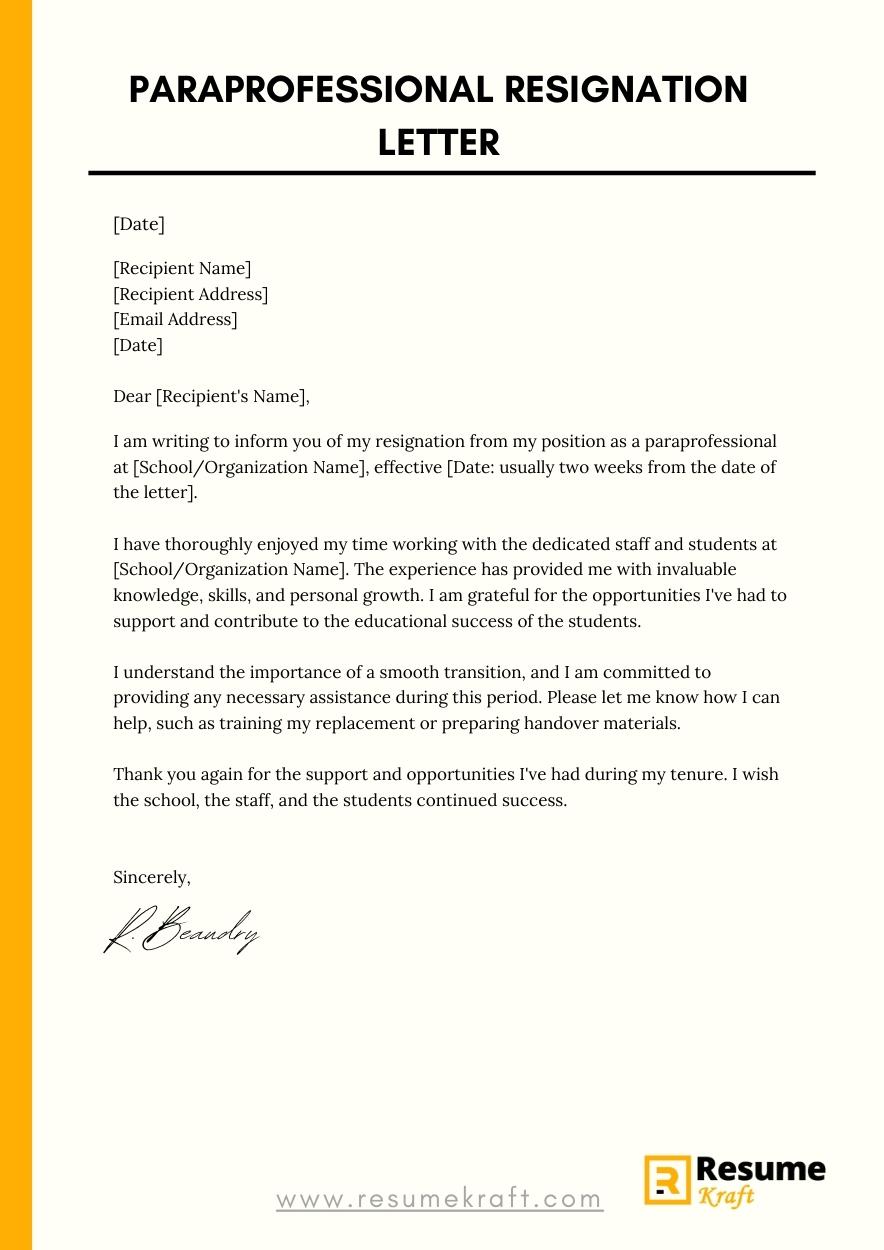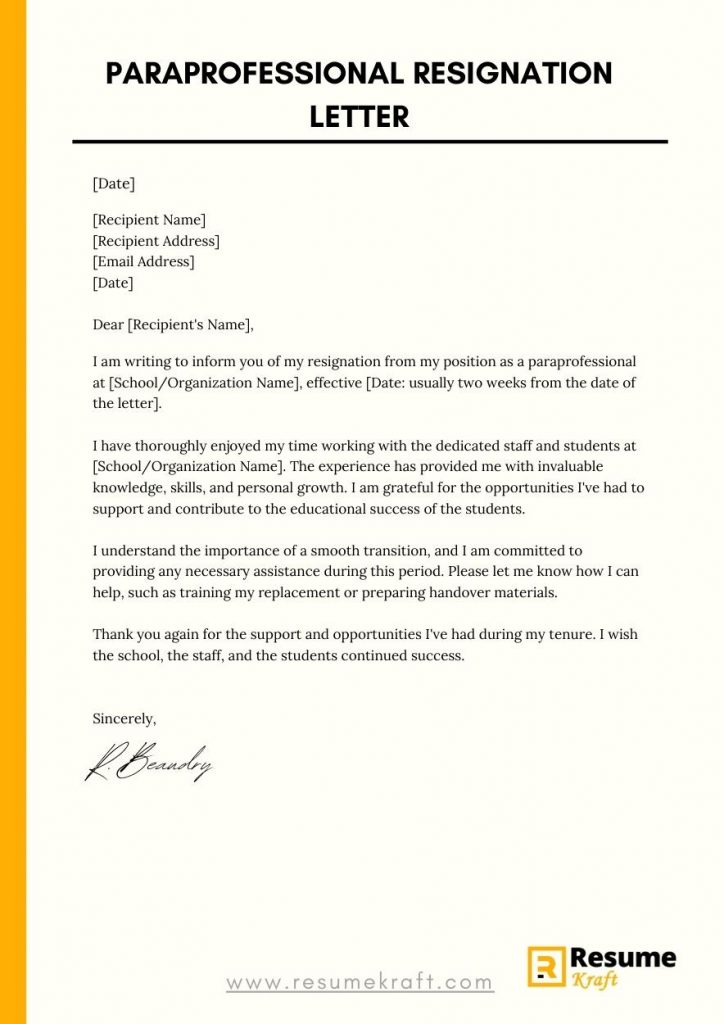
When you decide to resign from your position as a paraprofessional, it’s important to do so in a professional and respectful manner. One of the key steps in the resignation process is writing a formal resignation letter. In this article, we will guide you through the process of writing a paraprofessional resignation letter, including what to include, what not to include, and how to format it correctly. We will also provide you with samples of resignation letters to help you get started on crafting your own.
A well-written resignation letter can help maintain a good relationship with your employer and colleagues and preserve your professional reputation. So, let’s dive in and learn how to write an effective paraprofessional resignation letter.
What To Include in a Paraprofessional Resignation Letter
- Salutation: Start your letter with a professional greeting, addressing your supervisor or the relevant person by name. For example, “Dear Mr. Smith” or “Dear Ms. Johnson.”
- Statement of intent: Clearly state your intention to resign from your position as a paraprofessional. Specify the effective date of your departure to give your employer ample time to find a replacement.
- Reason for resignation (optional): While not mandatory, including a brief explanation for your resignation can be helpful. If you choose to do so, keep it concise and positive. Focus on personal growth, career advancement, or the pursuit of further education, rather than any negative aspects of the job.
- Gratitude and appreciation: Express your gratitude towards your employer and the opportunity to work as a paraprofessional. Highlight specific aspects of your experience that you valued or skills you developed during your tenure.
- Transition assistance: Offer your assistance during the transition period. This can include training your replacement, preparing handover notes, or any other relevant support you can provide to ensure a smooth transition for your successor.
- Closing: End your resignation letter on a positive note. Use a polite and professional closing, such as “Sincerely” or “Best regards,” followed by your full name and contact information.
What Not to Include in Your Paraprofessional Resignation Letter
While it’s important to convey your intentions and appreciation in your resignation letter, there are a few things you should avoid including:
- Negative comments: Refrain from criticizing or complaining about your job, colleagues, or the organization as a whole. Focus on the positive aspects instead.
- Detailed reasons: Avoid going into too much detail about why you’re resigning. Keep it brief and professional.
- Personal grievances: Do not use your resignation letter as an opportunity to air personal grievances or settle disputes. Maintain a professional tone throughout.
- Apologies: You don’t need to apologize for resigning. Resigning is a natural part of professional growth and career progression.
How To Format a Paraprofessional Resignation Letter
It’s essential to format your resignation letter correctly to ensure it is professional and easy to read. Follow these formatting guidelines:
- Use a professional tone: Keep your language formal and respectful. Avoid using slang or casual expressions.
- Use a clear and concise structure: Organize your letter into paragraphs, each serving a specific purpose. Use headings and subheadings to make it easy for the reader to navigate.
- Keep it brief: While it’s important to cover the necessary points, aim to keep your letter to one page. Be concise and to the point.
- Proofread: Before sending your resignation letter, carefully proofread it for any spelling or grammatical errors. A well-written and error-free letter demonstrates professionalism.
Paraprofessional Resignation Letter Samples
To help you get started, we have provided two samples of paraprofessional resignation letters – one printed letter sample and one email resignation letter example.

Printed Resignation Letter Sample
[Your Name]
[Your Address]
[City, State, ZIP Code]
[Email Address]
[Phone Number]
[Date]
[Recipient’s Name]
[Recipient’s Job Title]
[School/Organization Name]
[Address]
[City, State, ZIP Code]
Dear [Recipient’s Name],
I am writing to inform you of my resignation from my position as a paraprofessional at [School/Organization Name], effective [Date: usually two weeks from the date of the letter].
I have thoroughly enjoyed my time working with the dedicated staff and students at [School/Organization Name]. The experience has provided me with invaluable knowledge, skills, and personal growth. I am grateful for the opportunities I’ve had to support and contribute to the educational success of the students.
I understand the importance of a smooth transition, and I am committed to providing any necessary assistance during this period. Please let me know how I can help, such as training my replacement or preparing handover materials.
Thank you again for the support and opportunities I’ve had during my tenure. I wish the school, the staff, and the students continued success.
Sincerely,
[Your Full Name]
Email Resignation Letter Example
Subject: Resignation – [Your Name]
Dear [Recipient’s Name],
I hope this email finds you well. I am writing to formally tender my resignation from my position as a paraprofessional at [School/Organization Name], effective [Date: usually two weeks from the date of the email].
I want to express my sincere gratitude for the opportunity to work alongside such dedicated colleagues at [School/Organization Name]. It has been a valuable experience that has enriched my professional growth. I am grateful for the support and mentorship I’ve received during my time here.
I am fully committed to ensuring a seamless transition for my replacement. Please let me know how I can assist, whether it be training, preparing handover materials, or any other necessary tasks to facilitate the transfer of responsibilities.
Once again, thank you for everything. I have truly enjoyed my time at [School/Organization Name], and I wish everyone continued success and fulfillment.
Best regards,
[Your Full Name]
Key Takeaways
Writing a paraprofessional resignation letter doesn’t have to be overwhelming. Here are a few key takeaways to remember:
- Keep your resignation letter professional and respectful.
- Clearly state your intention to resign and specify the effective date.
- Express gratitude for the opportunity and highlight positive aspects of your experience.
- Offer assistance during the transition period.
- Avoid negative or personal remarks in your resignation letter.
Follow these guidelines, and you’ll be on your way to crafting a professional and effective paraprofessional resignation letter.
Frequently Asked Questions
Q: Should I include my contact information in the paraprofessional resignation letter?
A: Yes, it’s important to include your full name, address, email address, and phone number at the beginning or end of the letter. This helps ensure that your employer can easily reach out to you if they need further information or have any questions.
Q: Can I hand-deliver my printed resignation letter instead of mailing it?
A: Absolutely! Hand-delivering your resignation letter can add a personal touch and demonstrate your professionalism. Make sure to deliver it to the appropriate person, such as your supervisor or the HR department, and request a receipt or confirmation of receipt.
Q: Should I mention any outstanding leave balances or reimbursements in my resignation letter?
A: It’s not necessary to mention outstanding leave balances or reimbursements in your resignation letter. These matters can typically be addressed separately with the HR department or the appropriate personnel. However, if you want to ensure a smooth transition, you can offer to assist in any way with the documentation or process required for such matters.
Q: Is it necessary to have a face-to-face meeting with my supervisor before submitting my resignation letter?
A: There is no strict requirement to have a face-to-face meeting before submitting your resignation letter, but it can be a thoughtful and professional gesture if the opportunity is available. It allows you to discuss your decision in person and convey your intentions and appreciation directly to your supervisor.
Q: Is it possible to rescind a resignation letter if circumstances change?
A: While it is possible to rescind a resignation letter, it should be done with careful consideration and only if there is a valid reason for doing so. Speak with your supervisor or HR department as soon as possible if you find that you need to withdraw your resignation. Keep in mind that depending on the circumstances, the organization may or may not be able to accommodate your request.
Q: How much notice should I provide in my paraprofessional resignation letter?
A: It is customary to provide at least two weeks’ notice when resigning from a position. This gives your employer sufficient time to find a replacement or make any necessary arrangements. However, if you have a contract or specific company policy that outlines a different notice period, be sure to adhere to that.
Q: Can I mention any challenges I faced in my resignation letter?
A: When writing a resignation letter, it’s generally best to focus on expressing gratitude and positive aspects of your experience. While it’s okay to acknowledge challenges you may have faced, frame them in a constructive manner without placing blame on others. The goal is to leave on good terms and maintain a professional relationship.
Q: Should I ask for a reference in my resignation letter?
A: It is not necessary to explicitly ask for a reference in your resignation letter. However, expressing your appreciation for the opportunities and growth you experienced during your time as a paraprofessional can indirectly communicate your interest in a positive reference. You can also discuss the possibility of using your supervisor or colleagues as references in future job applications during separate conversations.
Q: Do I need to notify my colleagues about my resignation?
A: While it is not mandatory to personally notify all your colleagues about your resignation, it can be a considerate gesture to inform those you have worked closely with. You can choose to do this in person, via email, or through a farewell message. This demonstrates professionalism and allows for personal goodbyes and well wishes.
Q: Is it advisable to negotiate my departure date in the resignation letter?
A: It is generally recommended to specify a departure date in your resignation letter based on the standard notice period, which is usually two weeks. If you have specific reasons for needing a different departure date, it is best to address this in a separate conversation with your supervisor or HR department. Negotiating the departure date directly in the resignation letter could create confusion or misunderstandings.
Conclusion
Writing a paraprofessional resignation letter is an important step towards leaving your position on a positive note. By following the guidelines provided in this article and utilizing the provided sample letters, you can ensure that your resignation letter is professional, respectful, and leaves a lasting positive impression. Remember to be concise, express gratitude, and offer your assistance during the transition period. A well-crafted resignation letter will help you maintain a positive professional reputation and leave the door open for future opportunities.

